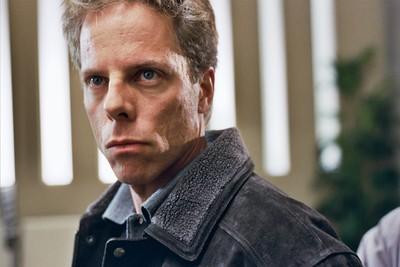Drama King
It's been a long and winding road, but "Self-Medicated" has finally found its way home.
The independent drama, based on filmmaker and star Monty Lapica's turbulent teen years in Southern Nevada, opens Friday in 15 cities, including Las Vegas -- after capturing 39 awards on the international film festival circuit.
"I wondered if the day would ever come," Lapica, now 27, says of "Self-Medicated's" theatrical release.
Lapica spent five or six months writing "Self-Medicated," which filmed in 2003 and 2004 (when he was 24) and had its world premiere at Las Vegas' own CineVegas film festival in 2005.
He and the movie spent the rest of 2005 and most of 2006 on the festival circuit. Finally, at the end of 2006, independent distributor Thinkfilm came calling.
"If it does well," Thinkfilm will expand the run, Lapica says. "It's dependent upon performance."
Based on "Self-Medicated's" award-winning reception at festivals from Rome to Houston, the odds seem to be in Lapica's favor.
The movie focuses on a Las Vegas 17-year-old (Lapica), reeling from his father's death, who turns to drugs and alcohol to escape his pain and anger -- prompting his overwhelmed mother (played by award-winning actress Diane Venora) to place him in a private Utah treatment facility that's more prison than rehab center.
Although "there was a lot of catharsis going on" while Lapica wrote the script, "that was not what inspired" the project, Lapica says.
Instead, "I thought it was an original story, fresh," he explains -- especially its focus on the "sort of secretive" Brightway Adolescent Hospital in St. George, Utah.
"I wanted to get a little bit of revenge," Lapica says of Brightway, which "Self-Medicated" depicts as a repressive, restrictive, soul-deadening lockup. Authorities shut down Brightway's St. George facility -- and an even more draconian operation in Western Samoa -- before "Self-Medicated" made it to the screen, however.
Lapica's experiences at Brightway found their way into the script nevertheless -- and rang true to Venora, who says Lapica's script "made me cry," particularly the "true sentiment" of a climactic scene.
"I could see it in my heart," she says. "It was so organic, so nonformulaic. ... I read that scene and I said, 'I've got to be part of that -- something that matters.' "
Venora -- who's worked with such acclaimed directors as Clint Eastwood (in "Bird" and "True Crime") and Michael Mann (in "Heat" and "The Insider") -- vividly recalls her initial meeting with the young Lapica, whom she describes as "a prettier version of Clint Eastwood, if such a thing is possible."
Lapica's "passion" for his project impressed her from the start, she comments. "In today's era of cool, he had passion," she says. "Cool leaches the passion from life."
Thinking "either this guy's crazy or he's a genius," Venora recalls, "I'll take the latter."
For Lapica, who wrote the mother's role with Venora in mind, her participation "helped us fill out the rest of the cast," which includes such familiar faces as Greg Germann (TV's "Ally McBeal") and Michael Bowen (TV's "Lost") as very different Brightway counselors.
Yet, true to its Las Vegas origins, filming "Self-Medicated" proved a definite gamble for Lapica's partner, producer Tommy Bell, who rounded up investors to finance the low-budget feature.
Although Lapica had no doubts he could direct "Self-Medicated" and play Andrew -- after all, he had lived the role -- his lack of directorial experience was "always a stumbling block" for investors, he admits.
"Luckily for me, (Bell) believed in my ability," Lapica says. "Especially considering I had nothing to show" as a calling card, having concentrated on screenwriting while majoring in film at Los Angeles' Loyola Marymount University.
Despite his lack of directing experience, "I was very confident in my ability," Lapica says. He just "needed a chance" to prove himself as director -- and leading man.
"There are never enough hours in the day to adequately prepare" for directing a movie, he says, "especially when you're spending so much time in front of the camera."
Instead of concentrating on shot lists and consultations with cinematographer Denis Maloney ("The Contender"), Lapica often was busy concentrating on the intensity of a scene.
And because of the movie's limited budget, "we didn't have the luxury of watching playback" of scenes on a video monitor, as many big-studio productions do.
"I had to trust my senses," Lapica explains. "Did it feel right? Did it feel authentic?" If so, then " 'OK, on to the next take.' "
Part of the movie's authenticity involves its portrait of Las Vegas -- from a native's viewpoint.
"Growing up in Vegas, you see Vegas depicted in movies, but it's never really the Vegas you know," Lapica observes. "It's an outsider's perspective."
As a result, Lapica was determined to "touch on the people that live there and work there."
To that end, "Self-Medicated" features a host of familiar Las Vegas locations, from the down-home Lou's Diner in Charleston Heights (playing a St. George eatery) to Bonanza High School, which Lapica attended.
Filming at his old high school was "really cool," he acknowledges. "It was quite a homecoming."
Especially because, "the last time I left the school," as a student, "I was asked to leave."
Like those of his on-screen alter ego, Lapica's own teen years overflowed with angry, self-destructive behavior following the death of his father, an emergency room physician who had a fatal heart attack in his sleep. His father was 48; Lapica was 14.
Recalling himself and his friends, "when I look back at all the risks we would take, the behavior -- the attitude of going through life as if you're indestructible," Lapica says, there's "certainly a great sense of relief" that he survived it all.
Eventually, with "time to mature, to reflect on what was important," Lapica overcame drugs and alcohol.
Among the factors he considers most important in his recovery: developing "a spiritual relationship with God" and strengthening his relationship with his mother -- who had a drug problem herself. (As "Self-Medicated" depicts it, the son was a pothead; the mom was a pillhead.)
"She's much better these days," Lapica says of his mother, Sally Lapica, who still lives in Spring Valley. "Together we were able to work on both of our issues," sharing "love and support and encouragement."
Fittingly, the movie's end credits include Lapica's dedication "For Mom, with eternal love."
Now that "Self-Medicated" has made it to theaters, Lapica's already pondering his next production, "Methodical," which he plans to write and direct.
Someone else will have to play the lead role, however.
After all, Lapica's already found the role of his lifetime: filmmaker.























